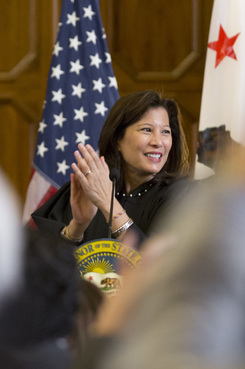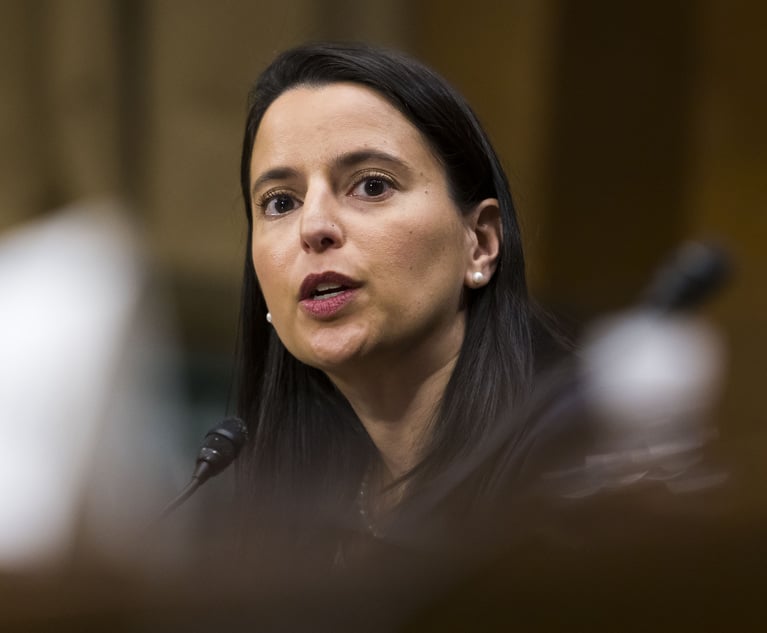Misconduct Claims Against Appellate Judge Raise Novel Workplace Questions
Chief Justice Cantil-Sakauye and the judiciary's chief administrative officer address workplace misconduct allegations against Conrad Rushing, who resigned from the Court of Appeal, Sixth Appellate District, effective Dec. 4.
December 11, 2017 at 07:15 PM
4 minute read
 Conrad Rushing. Credit: Jason Doiy/ The Recorder
Conrad Rushing. Credit: Jason Doiy/ The Recorder The investigation of now-retired Justice Conrad Rushing, who resigned from the bench amid claims of sexual harassment and misconduct, raised novel questions about workplace claims leveled against elected judicial officers and how they should be handled, judicial branch leaders said in a meeting with reporters on Monday.
The Commission on Judicial Performance can consider whether a judge's actions violated canons and merit discipline. But the commission does not police courthouses for workplace law violations.
“My understanding, at least in this particular case, you have a justice who is the presiding justice, so there's a complaint against him,” chief administrative officer Martin Hoshino told reporters Monday. “So where do you go with that? And after you get information that suggests something has happened here, where does it go then. It can't go to the actual person that it was about.”
Rushing, the former administrative presiding justice on the Sixth District Court of Appeal, has remained mum about the allegations, first reported last week by the San Jose Mercury News.
 California Chief Justice Tani Cantil-Sakauye
California Chief Justice Tani Cantil-SakauyeCalifornia's chief justice on Monday said the justices on the Sixth District Court of Appeal sought legal help to investigate complaints that one of their colleagues had engaged in alleged sexual misconduct and gender bias.
Tani Cantil-Sakauye, speaking to reporters at an annual meet-the-press gathering, said leaders of the appellate court approached the Judicial Council's legal services decision for recommendations on hiring a law firm to look into allegations made by court staff against Rushing, who was then then-administrative presiding justice.
The Sixth District justices also forwarded the accusations to the Commission on Judicial Performance, Cantil-Sakauye and Hoshino said. The chief justice said she knows nothing more about the complaints and their resolution.
“I received a [resignation] letter from Connie Rushing,” she said. “I can't even remember the language, whether it was 'retire' or 'resign,' but it was one or two sentences on plain paper and the envelope.”
Rushing, who served as the Sixth District's administrative presiding justice for more than a decade, retired on Dec. 4.
Days later the San Jose Mercury News reported that a court-commissioned investigation, completed by a Sacramento law firm, had concluded in May that Rushing had viewed nude photos of women in his chambers, commented regularly on women's appearances and gave preferential assignments to male employees while making women staffers pack his household belongings.
The report also found that Rushing made disparaging comments about Portuguese-Americans, according to the Mercury News.
The Commission on Judicial Performance will not confirm or deny the existence of an investigation. Sixth District court leaders, too, have declined to comment on “personnel matters” involving Rushing or court employees. Judicial Council officials have said the administration's role was limited to helping the appellate court find a law firm.
Elected judicial officers, like lawmakers, “have to find their own way to figure out how they mete out discipline and preserve their workplaces among themselves,” Hoshino said.
Cantil-Sakauye added: “If a judicial officer is elected in his or her county or state or jurisdiction the authority to remove [him or her] lies with voters or the Commission on Judicial Performance. I am not their boss.”
The chief justice said she has experienced harassment during her legal career—”being called 'sugar' and 'honey' and 'girls' while I was a trial lawyer”—but she declined to offer more specifics about those instances.
Cantil-Sakauye said the environment for women in the judicial branch “has definitely improved,” although “we can always do more.”
“What we're seeing today is kind of a symptom of overall treatment in the workforce,” Cantil-Sakauye said.
Read more:
Court Staff, Judiciary Mum on Misconduct Claims Against San Jose Appellate Judge
Report: San Jose Appellate Judge Resigned Amid Harassment Probe
This content has been archived. It is available through our partners, LexisNexis® and Bloomberg Law.
To view this content, please continue to their sites.
Not a Lexis Subscriber?
Subscribe Now
Not a Bloomberg Law Subscriber?
Subscribe Now
NOT FOR REPRINT
© 2025 ALM Global, LLC, All Rights Reserved. Request academic re-use from www.copyright.com. All other uses, submit a request to [email protected]. For more information visit Asset & Logo Licensing.
You Might Like
View All
Latham Adds Former Treasury Department Lawyer for Cross-Border Deal Guidance
2 minute read
Law Firms Expand Scope of Immigration Expertise Amid Blitz of Trump Orders
6 minute read
Trending Stories
- 1Public Notices/Calendars
- 2Wednesday Newspaper
- 3Decision of the Day: Qui Tam Relators Do Not Plausibly Claim Firm Avoided Tax Obligations Through Visa Applications, Circuit Finds
- 4Judicial Ethics Opinion 24-116
- 5Big Law Firms Sheppard Mullin, Morgan Lewis and Baker Botts Add Partners in Houston
Who Got The Work
J. Brugh Lower of Gibbons has entered an appearance for industrial equipment supplier Devco Corporation in a pending trademark infringement lawsuit. The suit, accusing the defendant of selling knock-off Graco products, was filed Dec. 18 in New Jersey District Court by Rivkin Radler on behalf of Graco Inc. and Graco Minnesota. The case, assigned to U.S. District Judge Zahid N. Quraishi, is 3:24-cv-11294, Graco Inc. et al v. Devco Corporation.
Who Got The Work
Rebecca Maller-Stein and Kent A. Yalowitz of Arnold & Porter Kaye Scholer have entered their appearances for Hanaco Venture Capital and its executives, Lior Prosor and David Frankel, in a pending securities lawsuit. The action, filed on Dec. 24 in New York Southern District Court by Zell, Aron & Co. on behalf of Goldeneye Advisors, accuses the defendants of negligently and fraudulently managing the plaintiff's $1 million investment. The case, assigned to U.S. District Judge Vernon S. Broderick, is 1:24-cv-09918, Goldeneye Advisors, LLC v. Hanaco Venture Capital, Ltd. et al.
Who Got The Work
Attorneys from A&O Shearman has stepped in as defense counsel for Toronto-Dominion Bank and other defendants in a pending securities class action. The suit, filed Dec. 11 in New York Southern District Court by Bleichmar Fonti & Auld, accuses the defendants of concealing the bank's 'pervasive' deficiencies in regards to its compliance with the Bank Secrecy Act and the quality of its anti-money laundering controls. The case, assigned to U.S. District Judge Arun Subramanian, is 1:24-cv-09445, Gonzalez v. The Toronto-Dominion Bank et al.
Who Got The Work
Crown Castle International, a Pennsylvania company providing shared communications infrastructure, has turned to Luke D. Wolf of Gordon Rees Scully Mansukhani to fend off a pending breach-of-contract lawsuit. The court action, filed Nov. 25 in Michigan Eastern District Court by Hooper Hathaway PC on behalf of The Town Residences LLC, accuses Crown Castle of failing to transfer approximately $30,000 in utility payments from T-Mobile in breach of a roof-top lease and assignment agreement. The case, assigned to U.S. District Judge Susan K. Declercq, is 2:24-cv-13131, The Town Residences LLC v. T-Mobile US, Inc. et al.
Who Got The Work
Wilfred P. Coronato and Daniel M. Schwartz of McCarter & English have stepped in as defense counsel to Electrolux Home Products Inc. in a pending product liability lawsuit. The court action, filed Nov. 26 in New York Eastern District Court by Poulos Lopiccolo PC and Nagel Rice LLP on behalf of David Stern, alleges that the defendant's refrigerators’ drawers and shelving repeatedly break and fall apart within months after purchase. The case, assigned to U.S. District Judge Joan M. Azrack, is 2:24-cv-08204, Stern v. Electrolux Home Products, Inc.
Featured Firms
Law Offices of Gary Martin Hays & Associates, P.C.
(470) 294-1674
Law Offices of Mark E. Salomone
(857) 444-6468
Smith & Hassler
(713) 739-1250







